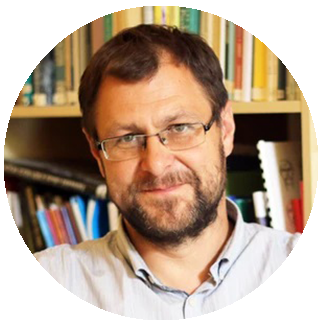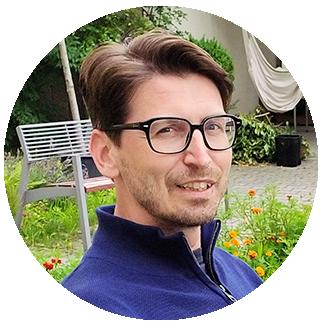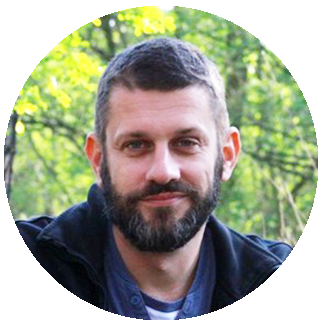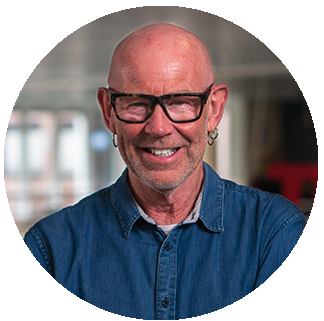PROJECT
Education for improving human rights situation of people with mental disorder
January 2022–April 2024
ORIGIN OF THE PROJECT
Why did we write the project?
Seven years ago we met Sarah Rae from the United Kingdom and David Crompton from Australia. Both have been active in advocating for a reduction of restraint use in psychiatry in their respective countries. They told us unequivocally, “Restraint use can be significantly reduced if you focus on it.” In the Czech Republic, mental health care reform was already underway at that time, but no one seemed to be paying much attention to the topic of restraints. We decided to change that. In cooperation with the Ministry of Health, we carried out the Research on the Use of Restraints and subsequently the Analysis of Regime Measures. It was confirmed that a proportion of people admitted to psychiatric hospitals do indeed have very negative, sometimes traumatic experiences in relation to restraint. At the same time, people working in direct care in healthcare settings commonly face situations for which they are not adequately prepared. We were struck by how little support these people receive compared to the demands placed on them. The logical step then was to find facilities that are motivated to improve conditions in acute psychiatry, raise funds and invest them in better training of health professionals and implementing effective changes that will reduce the need to use restraints.
The project was planned in cooperation with the Ministry of Health and is implemented thanks to the support of the EEA and Norway Grants and in close cooperation with a foreign partner. We believe that it will be just the first of many more steps that will help to ensure that people admitted to psychiatry leave with a good experience and that frontline staff do their job perfectly prepared, responsible and happy.
PURPOSE AND OBJECTIVES
What do we want to achieve?
The long-term intention of all activities is to contribute to the deepening of respect and fulfilment of human rights of people with mental illness in psychiatric inpatient facilities in the Czech Republic.
The objectives set by us are also aimed at fulfilling this goal:
- Improving human rights standards and developing a supportive and safe environment in patient care in the six participating psychiatric inpatient facilities by 2024.
- Reducing the frequency of restraint use by 6% and introducing qualitative changes in the setting of rules and regimes in selected wards in the psychiatric inpatient facilities involved in the project.
Our actions are primarily aimed at cultivating care for people with mental issues in psychiatric inpatient facilities. They are dedicated to staff training and to creating an environment and rules that contribute to building a supportive atmosphere on the wards based on mutual respect, understanding and a sense of security for both patients and staff.
RESULTS
What will change and what will be created?
The staff of collaborating psychiatric inpatient facilities will know how to prevent conflicts with inpatients and how to handle disagreements or tensions to prevent them from escalating and resulting in the use of restraints, and will apply this in their practice.
In cooperation with foreign experts, two two-day training modules will be created to provide training in conflict de-escalation and to introduce the Safewards model. Trainers for these modules will be trained from amongst professionals and selected candidates with their own experience of recovery from mental illness. Participating psychiatric inpatient facilities will then be able to train additional staff internally.
The managers of the participating psychiatric inpatient facilities will have an increased awareness of the possibilities of changing the environment and setting up regime measures on the wards leading to conflict prevention.
Each collaborating ward will develop a plan for the changes that will be implemented.
It is expected that due to the erudition of the staff and the introduction of changes in individual wards, the use of restraints will be reduced. Therefore, the project experts together with the staff of the cooperating wards will create a methodology for recording restraints, which will unify their recording and will be used to map the changes. The methodology will be subsequently provided to the Ministry of Health of the Czech Republic.
In addition to the analysis of data from the restraint records, the findings of the project experts from ongoing monitoring visits to the cooperating wards will be used to support the assumption of the impact of the implemented changes on reducing the use of restraints.
All this will be subsequently evaluated in the final impact monitoring report of the project activities.
ACTIVITIES
What will be done?
Training of staff of psychiatric wards involved in the project
International internships in Norway organised by the project partner organisation University of South-Eastern Norway for managers and direct care staff of the involved wards: a visit to the university and several psychiatric wards of Akershus University Hospital.
workshop
Human rights in psychiatric care
The workshop offers a legal perspective on topics related to hospitalization, complemented by the perspective of a trainer with own experience. It is also dedicated to identifying current sources of tension in participants’ practice and sharing insights on best practices.
Date and place: 26 April 2022, Prague
Trainers: Marie Lukasová and Markéta Vítková
workshop
How to create an environment that reduces conflict and promotes human rights
The workshop offers several perspectives on creating a safe and welcoming environment in a psychiatric care unit that contributes to conflict prevention and promotes respect for human rights. It looks at requirements and recommendations for technical and material equipment, as well as organisational measures and the active creation of a supportive environment.
Date and place: 22 June 2022, Prague
Trainers: Mostafa Tousson, Adam Žaludek, Tomáš Petr anf Marek Procházka
workshop
Conflict prevention (Safewards model)
The workshop introduces the Safewards model, which aims to build a safe environment – preventing conflict and reducing control in mental health wards. It offers specific tools and practices and focuses primarily on staff attitudes.
Date and place: 12-13 September 2022, Prague
Trainer: Geoff Brennan
Invitation (pdf version in Czech)
workshop
Application of de-escalation techniques
The workshop offers both theoretical knowledge and practical skills training. Specifically, it focuses on the theory of emotional reactions, communication with agitated patients and verbal calming of ongoing aggression.
Date and place: 3-4 November 2022, Prague
Trainers: Michael Aaldering, Juel Kenneth (Institut for Sikkerhed)
OTHER ACTIVITIES
Development of training modules and training of trainers in practice
Based on the knowledge and skills acquired during the workshops and the experience of the experts, two two-day learning modules will be developed to introduce the Safewards model and the application of de-escalation techniques. For their further teaching, trainers will be trained from among the professional staff of the inpatient facilities involved in the project and trainers with their own experience.
Other staff of the psychiatric inpatient facilities involved in the project will then participate in the pilot teaching of the newly developed courses.
Evaluation of impacts
Creation of a methodology for recording restraints
For the purpose of obtaining data on the use of restraints in the cooperating wards, the project experts, in cooperation with the staff of the cooperating psychiatric inpatient facilities, will prepare a methodology for recording restraints that will unify their records.
Creating a change plan
All collaborating wards will develop a plan for the changes that will be implemented during the course of the project.
Systematic monitoring
In order to evaluate the impact of the project activities and to support our assumption that the use of restraints will be reduced due to the erudition of the staff and the introduction of changes in the collaborating wards, the project experts will visit the collaborating wards regularly and monitor the changes.
Final report from monitoring the impact of project activities
From the analysis of the data of the restriction register and the conclusions of the monitoring visits, we will produce a final report on the monitoring of the impacts of the project activities.
WRITE ABOUT US
Říčan, P., Procházka, M. (2022). Experiences with QualityRights audits and efforts to reduce restraints. WAPR Bulletin, 48, 26–30.
Who is behind it?
Supported by the EEA and Norway Grants.
The project is implemented by the Centre for Mental Health Care Development, a non-profit organization that has been operating since 1995. It cooperates with top Czech and foreign experts. The experts include people with their own experience of recovery from mental illness.
Its mission is to inspire and connect professionals, people living with mental illness and their loved ones. Together with them, it transforms and develops mental health care to be both effective and respectful, based on the needs and wishes of those it serves.
The project partner is Norway’s fourth largest university, the University of South-Eastern Norway. It employs 1 800 people and offers education to approximately 18 000 students. It offers professionally and entrepreneurially oriented educational programmes, research and knowledge dissemination at a high international level. It is currently headed by Rector Petter Aasen.
Professor Bengt Eirik Karlsson, who is in charge of the project activities in Norway and is also a consulting support for the Czech expert team, is working closely with the project.
COOPERATING ORGANISATIONS
We cooperate with six psychiatric inpatient facilities across the Czech Republic. One ward from each facility is selected to be in closer contact with us and actively participates in all events.
![]() Psychiatrická nemocnice Horní Beřkovice
Psychiatrická nemocnice Horní Beřkovice
(male acute ward, 2 B)
![]() Ústředí vojenská nemocnice Praha
Ústředí vojenská nemocnice Praha
(psychiatric ward)
![]() Psychiatrická nemocnice Jihlava
Psychiatrická nemocnice Jihlava
(male detention ward, 4 B)
![]() Fakultní nemocnice Plzeň
Fakultní nemocnice Plzeň
(acute psychiatric ward)
![]() Psychiatrická nemocnice Bohnice
Psychiatrická nemocnice Bohnice
(ward of acute care, 27)
![]() Fakultní nemocnice Ostrava
Fakultní nemocnice Ostrava
(psychiatric ward)
Project Board
We will keep other professionals in the field of mental health care informed about the activities and outcomes of the project. Regular meetings of the project council will be convened, where representatives of the Ministry of Health of the Czech Republic, the Czech Psychiatric Association, the Psychiatric Section of the Czech Association of Nurses and other institutions will be invited to present the findings and materials produced.
PROJECT EXPERTS

Pavel Říčan studied sociology. For many years he worked directly in community services for people with mental health issues. He has long tried to combine his interest in science with his interest in changing the world of mental health care for the better. He has been involved in research and impact evaluation projects (restraint research, evaluation of Mental Health Centres, evaluation of the transformation of Home On The Road). Helps to introduce innovations and new approaches – involving people with experience of mental illness in multidisciplinary teams and teaching in universities, providing early intervention services, setting up recovery colleges etc. He has been the Director of the Centre of Mental Health Care Development since 2014. He enjoys working in an ambitious, motivated team that can bring ideas to life. He considers it important to work with partners abroad, has completed a number of internships, and has experience supporting service transformation in Moldova. He is also active in the coordination of the international network The CARe Network. He likes to alternate academic and project work with work on the farm and in the forest in the South of Bohemia, where he has lived for the last 25 years.

Mgr. Tomáš Petr, Ph.D. is a psychiatric nurse with experience in various areas of psychiatric care. He has worked at the Psychiatric Hospital in Bohnice in various types of wards – acute care, gerontopsychiatry, addiction treatment, etc. For several years he was also involved in the management of the hospital in the role of deputy head nurse. Currently she works as a head nurse of the psychiatric department of the Central Military Hospital. In addition to inpatient psychiatric care, he also has experience in various types of community services. He has worked in sheltered housing for people with mental illness and is now involved in building the Mental Health Centre for Prague 6. He has extensive international experience, having worked in a psychiatric hospital in England for 2 years and completed numerous internships in various psychiatric services across Europe (Germany, Holland, Norway, Sweden, Italy). He is the chairman of the Psychiatric Section of the Czech Association of Nurses and a member of the committee of the European Association of Psychiatric Nurses HORATIO. He has been cooperating with the Office of the Ombudsman for a long time as an expert on the respect of human rights in the provision of health and social services and is also an expert of the CPT (European Committee for the Prevention of Torture and Inhuman and Degrading Treatment or Punishment) in the field of psychiatric care. He actively lectures and publishes on various topics in the field of psychiatric nursing in the Czech Republic and abroad. He is a member of the Executive Committee for the expert guarantee of the Strategy for the Reform of Psychiatric Care.

Psychologist, 47 years old. Since 2019 he has been working at the Horní Beřkovice Psychiatric Hospital as a manager of transformation projects. At the Ministry of Health of the Czech Republic as a quality manager in the Deinstitutionalization project. Once in a non-profit organization (services for addicts), then a soft skills lecturer and occasional translator from English (e.g. John Gottman’s book The Seven Principles of a Satisfying Marriage), ward psychologist, therapist. A happy husband and old father of a one year old son, whom he tries to raise normally and have time for. That’s why he moved from Prague to Beřkovice. In his free time he used to go on trips, read stoics and spiritual literature. Now he doesn’t have it and he’s rehabilitating his back, but one day he’ll come back to it.
Bengt Karlsson, RPN, MSc., Dr.polit.
Bengt is a professor in mental health care at the Faculty of Health and Social Sciences at the University of South-Eastern Norway. He is also the head of the Centre for Mental Health and Substance Abuse at the university. He works part-time as a researcher at the Mental Health Unit at the University Hospital of Akershus. His research focuses on the field of mental health and substance abuse, especially the use of the Open Dialogue method in different settings, recovery and collaborative research together with people with lived experience.
 Mgr. Lenka Březinová
Mgr. Lenka Březinová
project manager
Lenka has been a project manager and coordinator since 2009. During this period, she has mainly worked on projects related to mental health. Thanks to her coordination and organization, community service workers for people with mental illness in the Czech Republic have been supported through further training and internships abroad. A training programme for dual diagnosis service providers was developed with her support. In recent years, she has focused on the involvement of peer specialists in mental health services. Lenka is a mother of two boys who keep her fully employed. She enjoys spending her free time being active – especially in the water. In her next life she would like to be an otter.
EASY CONTACT
MGR. LENKA BŘEZINOVÁ
project manager
E: brezinova@cmhcd.cz
T: +420 778 502 171

